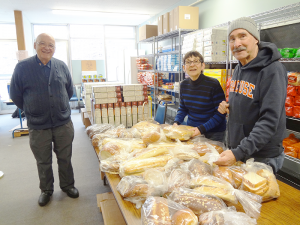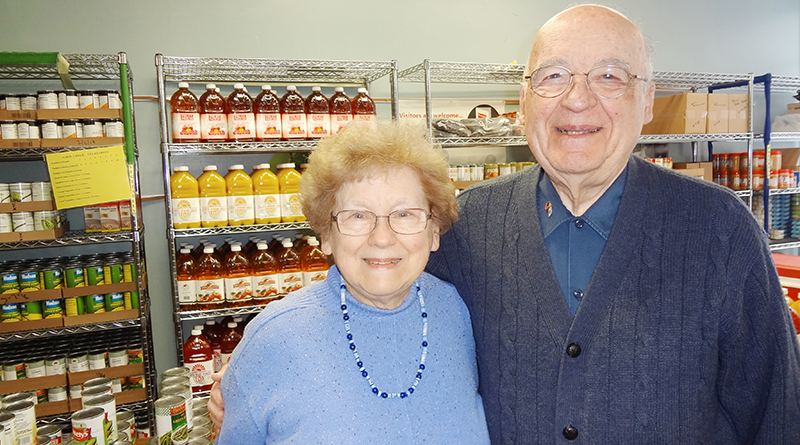Partners with a Passion
North Syracuse couple fills needs by featuring community food pantry, supplying clothing to less-fortunate
By Carol Radin

On Friday mornings, Sue and Ernie Wass stand at the door of a food distribution room at Temple Society of Concord welcoming a line of people waiting for food.
They are people from the surrounding Syracuse University neighborhood who need to supplement their public assistance food allowances.
Sue and her husband Ernie, along with other volunteers, busy themselves with preparations. They package Panera-donated breads and bagels, restock the table of canned meats and stews, arrange rows of Cheerios and Wheaties, and bag the fresh zucchini and tomatoes from a local farm.
The volunteers pitch a steady flow of questions to Sue, who knows all the answers.
“When are the canned peaches and plums coming in?” “Do we want to put eight oranges in each bag instead of six since they’re small?” “Does this can of ravioli meet protein guidelines?”
Sue, 83, responds to each question and moves on to another room set aside for signing in applicants. She takes out the card file and loose-leaf binder of peoples’ records and lines up the week’s nutrition pamphlets. Meanwhile, Ernie, 84, makes sure pitchers of juice and baskets of graham crackers are filled on a nearby table for snacks for the children who accompany their parents.
Another volunteer rearranges the shoes and shirts on the clothing donation table, stacks toilet paper and shampoo on the “miscellaneous” shelf, and unloads a carton of donated children’s books.
Finally, Sue goes back to the hallway where everyone waits and gives the signal in her soft voice: “You can come in now.”
Quickly and quietly, they form a line at the table in the intake room. As Sue pulls out the index cards for each person who is there, she calls out their names one by one.
That’s when big grins erupt in the line. “Hey, you remembered my name!” a young man says. “High five!”
The Wasses, residents of North Syracuse, have been putting a name and face to people who come to Temple Concord’s food pantry for over 16 years.
“We started volunteering when we retired,“ Sue explained. Not long after, the temple found itself seeking a new volunteer coordinator. “It was ours. Just like that, we had a new “job,” Sue said.
In her former professional life, Sue was a Section 8 program administrator for the village of North Syracuse Housing Authority. So she was able to translate her problem-solving and organizational skills immediately into the pantry operations. Ernie was an engineer at Bristol-Myers whose attention to detail, combined with his inherent empathy and people skills, keeps him in sleeves-rolled-up mode for whatever needs to be done hour by hour.
Collaborative effort
Under the Wasses’ conscientious oversight, the pantry evolved from a small room filled with assorted canned goods collected from Temple Concord’s congregants to a larger, more comprehensive operation that adheres to guidelines from the Food Bank of CNY.
The pantry is able to buy much of its food from the food bank, in addition to donations from temple congregants and local groups, businesses and farms.
Where once the food pantry was housed in a small stock room, with cartons of canned goods that patrons would reach into for their canned fish, beans, rice and cereal for the week, the pantry site occupies two large re-purposed classrooms at Temple Concord. They are the intake room where patrons sign in and browse through the clothing and book donations, and a second room where food items are arranged on tables that are “stations” for each food group. Featured are fresh produce, canned vegetables, canned protein items like tuna, peanut butter and beef stew, frozen fresh meat, cereal and breads.
A month in the life of the food pantry entails a multitude of details: the Friday distributions; review of applications; food bank deliveries that must be unloaded, catalogued and shelved; written reports and data collection for the food bank; and the occasional meeting or conference with other area food providers.
Sue, in particular, knows every detail of running the pantry, from communication with food providers to regulations governing eligibility for food assistance to guidelines for nutritional requirements. She and Ernie also know the personal side. They know which of the “regulars” needs gluten-free food, which families need disposable diapers, and who is picking up food for the friend next door recovering from hip surgery.
The couple also relies on other regular volunteers as well as Syracuse University students and teens from temple youth groups. “We couldn’t keep the pantry going without the volunteers who help us with all aspects of the pantry,” Sue said.
The community needs have always been great. In Sue and Ernie’s first fall and winter as coordinators, as word got around, the food pantry served an average of 100 families or individuals per week and relied on congregants’ donations alone. It was after that winter that Sue and Ernie adopted the food bank’s guidelines for neighborhood territories, each of which is served by a particular house of worship or community center.
Now serving the southeast area bordered by Syracuse University to the south and Erie Boulevard to the north, Temple Concord’s pantry provides for an average of 65 families or individuals per week.
No one goes hungry
Even as they adhere to Food Bank of CNY guidelines, Sue and Ernie never turn anyone away. If a new applicant resides in a neighborhood covered by a different food pantry and didn’t realize it, Sue will say, “Get your food here today. But next week, here is the place you need to go,” and she’ll hand that person a pre-printed card with the appropriate food pantry and address.
If someone forgets personal identification for the initial application, she’ll request that they bring an ID with birthdate and address next time. If the person forgets a second time, she says, “You have one more chance. You can have your food today, but you’ll bring your ID next time, right?” Fortunately, people do, she said.
Although Sue projects a business-like demeanor, and everyone respects that, both she and the regular patrons have settled into a comfortable rapport. Conversations break out weekly about one person’s upcoming surgery, another’s long stay in the hospital, another’s trip down south to see family, or an upcoming job interview.
A woman once pulled out her phone to show pictures of her wedding at city hall two days before. Depending on the season, many are eager to offer up critiques of S.U. football, basketball, the New York State Fair, the recipe they tried last week, and, as always, the weather.
Above all, the one constant in conversation is the weekly greeting. When Sue asks, “How are you?” many respond, “I am blessed, thank you.”
The remark opens Sue’s usually serious face into a smile. She closes her eyes and nods mindfully, as if to say, yes, she too knows the blessings she has. As individuals move on to the food distribution room, the other volunteers extend the same good will, engaging each patron with friendliness and respect.
Side by side, Sue and Ernie share this endeavor as they have shared their life-long partnership in marriage and parenting.
Recently celebrating their 64th wedding anniversary, they have raised five daughters and now boast 10 grandchildren and six great-grandchildren. Though most of the “kids” live in other cities, like Cleveland, Ohio, and Charlotte, N.C., Sue and Ernie hop in their car for frequent visits. They never miss a graduation, a bar or bat mitzvah, or a milestone birthday. They even make long trips to Toronto to see cousins and attend reunions.
Both are also accomplished musicians who are active in community bands. Ernie played the tuba for the Baldwinsville Community Band, and both of them perform in Syracuse’s Keyna Hora Klezmer Band, with Ernie on violin and Sue on keyboard.
Their lives are truly rich with family, music, and good health and energy to facilitate what the pantry requires. Asked why they volunteer to carry on the pantry, Sue simply shrugs and says, “I’m not sure how I can say it. It’s just our way of giving back to the community.” For Sue and Ernie, it is not something that requires a lot of thought.
Their actions tell the story, as they reach out every week to people who reach back and say, “High five! You remembered me!”

